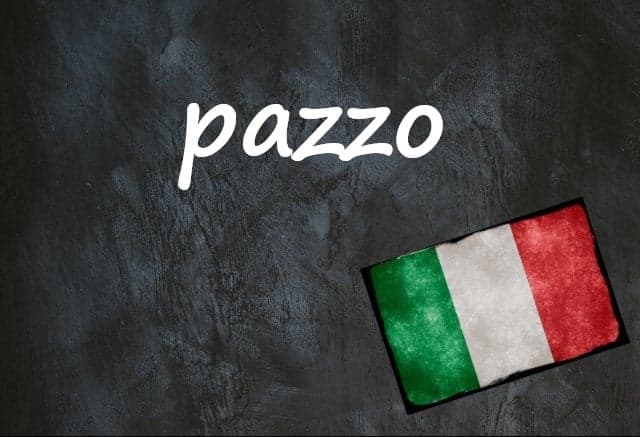
Italian word of the day: 'Pazzo'

If you're crazy about learning Italian, this is a word to add to your vocabulary.
Pazzo means 'crazy', and is mostly used in the figurative sense. It's an adjective, so when talking about masculine nouns it keeps its standard 'o' ending, and changes to an 'a' ending when defining a feminine noun.
You might also see the related noun pazzia ('madness', 'craziness').
Pazzo is also a noun meaning 'madman' (un pazzo, una pazza, i pazzi), and like in English, it is extremely rude to use pazzo to refer to someone with mental health problems.
You'll still hear the noun used in comparative phrases, such as dovevamo lavorare come pazzi (we had to work like mad) or guida come un pazzo (he/she drives like a lunatic), but if you're not totally confident with Italian, it's best to avoid the noun.
The adjective is informal and best saved for use with friends rather than colleagues, but you'll hear it a lot in Italy.
It's still offensive to use the adjective pazzo to describe someone's mental health problems, but when used figuratively (which is more common) to describe someone a bit out of the ordinary, particularly someone who goes against the grain or is a bit reckless, it tends to have an affectionate or admiring tone.
Tone has a big impact, so the phrase 'ma sei pazzo?' (are you crazy?) could be said with fondness, perhaps in reaction to a friend's ambitious plans, but can also be used as an insult and said with anger when the speaker disapproves of the other person's actions.
- Sei pazzo/a, ti amo!
- You're crazy, I love you!
- È sempre stata un po’ pazza
- She's always been a bit mad
You'll also hear it used a lot to talk about love and infatuation, or strong emotions more generally, in which case it is used for emphasis:
- Sono pazzo/a per lui/lei
- I'm crazy about him/her
- Sono innamorato/a pazzo di lui/lei
- I've fallen madly in love with him/her
- Era pazzo/a di gioia
- He/she was beside him/herself with joy
And it can also describe ideas, films, events and so on which are seen as unusual, wild or foolish.
In these cases, whether it is positive or negative depends on the context and tone, but it often has the sense of 'unwise', as in the two examples below:
- A una velocità pazza
- At a crazy speed
- Fare spese pazze
- To make extravagant purchases
Do you have a favourite Italian word you'd like us to feature? If so, please email us with your suggestion.
Comments
See Also
Pazzo means 'crazy', and is mostly used in the figurative sense. It's an adjective, so when talking about masculine nouns it keeps its standard 'o' ending, and changes to an 'a' ending when defining a feminine noun.
You might also see the related noun pazzia ('madness', 'craziness').
Pazzo is also a noun meaning 'madman' (un pazzo, una pazza, i pazzi), and like in English, it is extremely rude to use pazzo to refer to someone with mental health problems.
You'll still hear the noun used in comparative phrases, such as dovevamo lavorare come pazzi (we had to work like mad) or guida come un pazzo (he/she drives like a lunatic), but if you're not totally confident with Italian, it's best to avoid the noun.
The adjective is informal and best saved for use with friends rather than colleagues, but you'll hear it a lot in Italy.
It's still offensive to use the adjective pazzo to describe someone's mental health problems, but when used figuratively (which is more common) to describe someone a bit out of the ordinary, particularly someone who goes against the grain or is a bit reckless, it tends to have an affectionate or admiring tone.
Tone has a big impact, so the phrase 'ma sei pazzo?' (are you crazy?) could be said with fondness, perhaps in reaction to a friend's ambitious plans, but can also be used as an insult and said with anger when the speaker disapproves of the other person's actions.
- Sei pazzo/a, ti amo!
- You're crazy, I love you!
- È sempre stata un po’ pazza
- She's always been a bit mad
You'll also hear it used a lot to talk about love and infatuation, or strong emotions more generally, in which case it is used for emphasis:
- Sono pazzo/a per lui/lei
- I'm crazy about him/her
- Sono innamorato/a pazzo di lui/lei
- I've fallen madly in love with him/her
- Era pazzo/a di gioia
- He/she was beside him/herself with joy
And it can also describe ideas, films, events and so on which are seen as unusual, wild or foolish.
In these cases, whether it is positive or negative depends on the context and tone, but it often has the sense of 'unwise', as in the two examples below:
- A una velocità pazza
- At a crazy speed
- Fare spese pazze
- To make extravagant purchases
Join the conversation in our comments section below. Share your own views and experience and if you have a question or suggestion for our journalists then email us at [email protected].
Please keep comments civil, constructive and on topic – and make sure to read our terms of use before getting involved.
Please log in here to leave a comment.